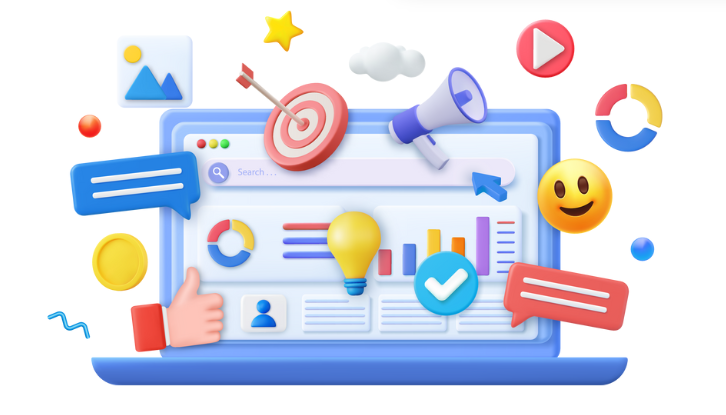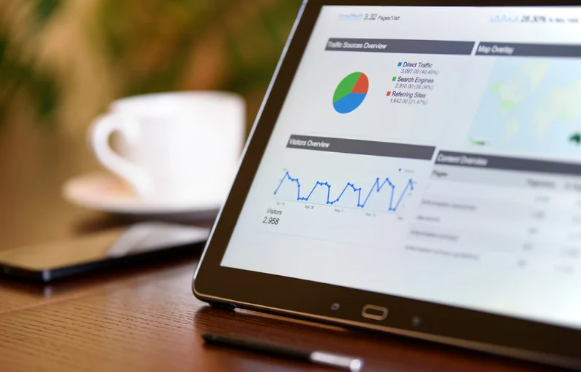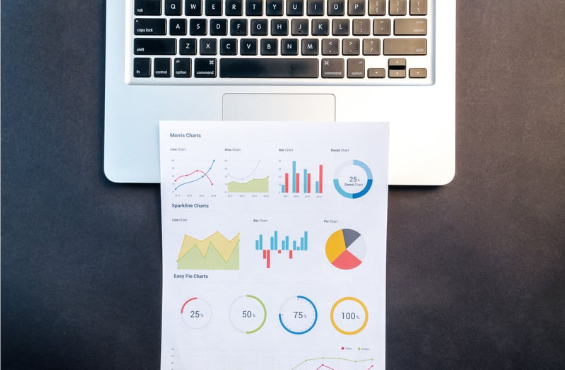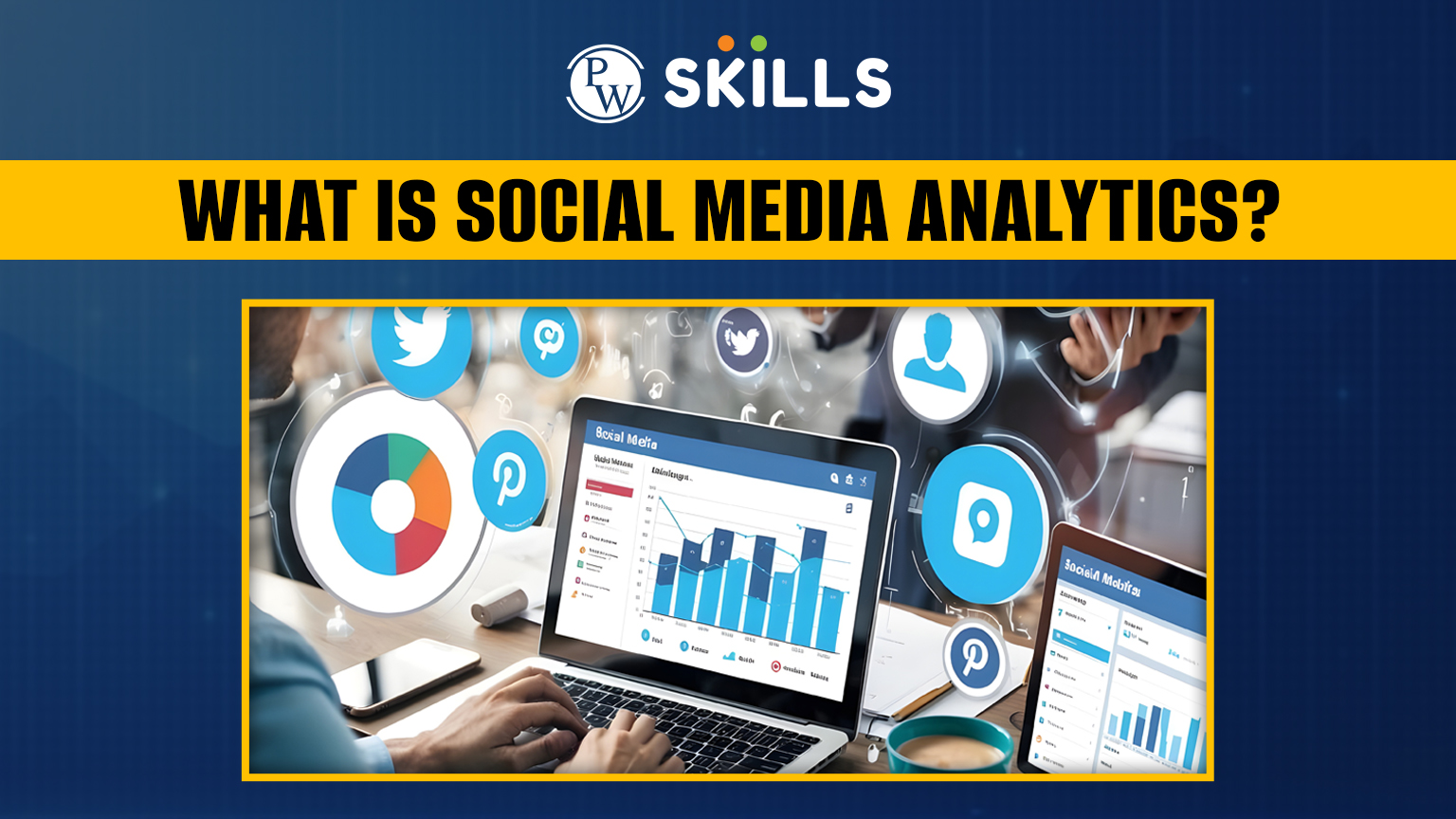Social media analytics is the analysis of data extracted from various social media platforms to help in informed decision making. Are you a content creator or social media marketer? As a content creator, you can use information extracted from social media analytics to know what is trending now.
More than 80% of businesses already use social media marketing techniques to drive sales and quality leads. With so many businesses and competition in the market, effective social media strategies are more important than ever. Here comes social media analytics to track performance, identify trends, and measure Return on Investment (ROI).
Also, social media marketers can extract information and use it to increase their brand’s visibility or help their clients reach their financial goals. Social media analytics can help you save time and effectively resource utilisation. Many advanced social media analytics are available in the market. Google Analytics is a free social media analytic tool available. In this article, let us know more about social media analytics.
Also Check: Digital Marketing Agencies in India
What is Social Media Analytics?
Social Media analytics is the process of extracting data from various social media channels to help individuals or businesses make informed business decisions. It also helps you calculate the performance evaluation by using effective and reformed strategies on different social media channels.

Social media analytics is not limited to like, share, comment, follow, retweets, previews, clicks, and impressions collected from an individual channel. Social media analytics can be used to track a wide range of metrics from different channels, including
-
- Reach: The number of people who visited your page or engaged with your content.
- Engagement: Total number of people who interacted with your content either by liking, commenting, sharing, or saving.
- Traffic: You can track real time traffic from different social media platforms.
- Leads and Sales: Monitor the number of sales and revenue generated from social media.
You can use social media analytics to track ongoing campaigns and initiatives. Social media analytics is a smart tool that can help you leverage insights to improve your overall social media strategy and achieve your social media goals.
Social Media Analytics Key Takeaways
- Social media analytics help businesses and individuals make informed business decisions and achieve goals and objectives.
- Tools like Google Analytics, Hubspot, and Keyhole. Brandwatch and Buffer are some of the popular social media analytics tools.
- Effective social media strategies can help you get a good Return on Investment (ROI).
- Data and insights can be collected from various social media channels such as Instagram, TikTok, X, Facebook, YouTube, and more.

Importance of Social Media Analytics Tools
In this data-driven age, businesses and individuals frame effective strategies to take their websites or brands to the top or increase visibility. Some of us want to increase our visibility while others want sales and good revenue.
Data and insights collected from various social media channels help in targeting the right audience based on current trends and requirements. Social media marketers can use these insights to adapt or shape their market strategy to help businesses make data informed decisions.
Measure Performance
You can monitor your brand performance by using tools like Google Analytics and more. Various metrics are provided on the dashboards that might help you make informed decisions.
For instance, you might get to know which product is performing better or have better feedback and make necessary changes accordingly. You can also analyse negative feedback or negative trends on any products and adjust your strategies accordingly.
Spot trends
Keeping an eye on social media analytics can help you analyse upcoming trends before they are effectively distributed in the market. When you know trends, you can effectively frame types of ads, topics, audiences, or platforms that might help you gain more visibility across various platforms.
When you are aware of what topics are trending and identify what type of topics can help you increase your rank and sales.
Setting Realistic and Informed Goals
Social media analytics can help you or your businesses set informed goals after collecting insights from different social media platforms. Analytics help businesses understand their audience preferences, behaviour, and interests to set realistic goals and achieve goals.
For instance, if you want to build your social media platforms then you need to be realistic while setting your goals. If your Instagram has 5k followers and you want to take it to 1 lakh within a quarter then that might not be a realistic goal. Set an achievable number by analysing social media analytics at various platforms using various social media analytics tools.
Tracking ROI
You can use different social media analytics tools to extract website traffic, lead generation, conversion, and track return on investments. This is a crucial step to knowing that your strategies are working and the investment you are making on your part is giving outcomes.
Also, do not expect a sharp rise, if there is even a slight increase or upward trend, then it means you are on the right path. While if there is a downward trend then you need to reframe your social media strategies.
Increased Customer Satisfaction
With the insights collected from the social media analytics, you can use what types of audiences require your services or might engage with your content. You must take into consideration customer opinions, trends, and feedback to improve your services and ensure customer satisfaction.
Competitive Analysis
You can extract important information, trends, gaps and implement market analysis to know what your competitors are doing that is providing them good results and make changes accordingly.
These social media insights can help you adjust your strategies and focus to make informed decisions.
Also Check: Digital Marketing Jobs
Free Social Media Analytics Tools: Google Analytics Tools

There are many Social media analytics tools that might help you monitor your brand performance, traffic, and lead flow to your website through your social media channels. Some of the best social media analytic tools are Google Analytics Tool, Meta Business Suite Insights, Instagram Insights, X Analytics, etc.
Google Analytics tools stand out from the rest of free social media analytics tools. It is best for professionals who are managing businesses or individually working on their brand. Google Analytics provides many features which can help you optimise your strategies based on the collected insights.
- Monitor which social media platform delivers you the most raw traffic and engagement.
- Know which content delivered the most leads and traffic on your platform
- Know your audience with their demographic data such as age, gender, location, and more.
- Get smarter insights on Return on Investment (ROI) based on your social media campaigns and take measures to improve. Leverage machine learning to get more value from the collected data.
- Get to know how your customers interact with different sites and apps.
- Analyse your data and generate quick and easy shareable reports.
Advanced Features on Social Media Analytics Platforms

With rapid changes in technologies, these social media analytics tools and platforms are also integrating these changes to offer you more effective insights and functionalities.
-
- Machine Learning: Leverage machine learning models to get more effective data processing, pattern recognition, and predictive capabilities. Analyse sentiments on different social media posts, comments, and reviews to determine whether it is positive or negative. Better categorization and audience segmentation can be achieved using machine learning and natural language processing.
- Segmentation: Effective segmentation is required in social media analytics to categorise audiences using their location, gender, marital status, parental status, and other demographics. Proper segmentation can help better tune messages and initiatives during campaigns.
- Sentiment Analysis: Different social media channels can now effectively be monitored to understand the tone and intent of social media. You can understand whether the response of the audience is positive or negative.
- Dashboards: Various visualization tools on social media analytic platforms like charts, graphs, and tables can help summarise insights collected from social media platforms.
Four Types of Social Media Analytics
There are four major types of social media analytics given below
- Descriptive analytics
- Diagnostic analytics
- Prescriptive analytics
- Predictive analytics
Descriptive Analytics
It is used to collect and analyse the data and insights collected based on past performance such as the number of likes, comments, and shares from content on the website. It is one of the most basic type of social media analytics
Diagnostic Analytics
The main focus of diagnostic analysis is to understand the reasons for the previous performance. You can collect which social media platform is driving the most traffic to your website. Also, know which type of content is more resonating with your audience.
Predictive Analytics
This analytics is focused on predicting future outcomes based on trends and insights collected from various sources. You can analyse how much traffic can be generated on a piece of content based on the content you generate.
Prescriptive Analytics
These analytics help you get more insights on how to improve your performance through different special media platforms. Frame a strategy for the type of content you should post to get better engagement.
Types of Social Media Analytics
There are six major types of social media analytics that will guide you to create more effective strategies.
Performance analysis
It is used to measure the overall performance of all your social media efforts and help you analyse which platform provided you with the best results. It generally includes the following
- Traffic/Impressions
- Reach
- Likes
- Shares
- Comments
- Clicks
- Sales/Revenue
Audience Analytics
Analyze the demographics of your audience to understand their opinions and needs.
- Age
- Gender
- Location/Geography
- Device
- Marital Status
- Parental Status
Competitor Analysis
You can monitor your competitor’s performance closely and analyse what is giving them better results to know where you can work on your strategies. Some of the common metrics you can use to compare are audience growth, public engagement average, etc.
Influencer Analysis
Track the success of your influence marketing on social media platforms and analyse the total number of interactions per post based on the audience size of each influencer. You can track engagement rates, content reach, and frequency of quality interactions with other users.
Sentiment Analysis
You can track your audience sentiments through various posts, comments, and other metrics on different social media platforms to understand whether they are positive regarding your products or you might need to make changes. You will know how users feel about your brand based on relevant keywords and topics.
Paid Social Analytics
When you are using paid social media posts and advertisements you need to make sure they are giving you good results, especially compared to organic advertisements. You must pay close attention to your paid social analytics based on the different factors given below.
- Click through rate
- Cost per click
- Clicks
- Total number of active ads
- Cost per action
- Conversion rate
- Total ad spend
For the first point of information, you can easily navigate your social media platforms where you are using paid advertisements and get various metrics there. For deep insights, you can look for other social media analytic tools.
Learn Digital Marketing with PW Skills
Engage in Digital Marketing with AI provided by PW Skills to know about core principles of digital marketing along with advanced AI techniques. Get in-depth learning including AI-powered tools to power up campaigns, SEO, and social media strategies.
Gain hands-on experience in website building, analytics with Google Analytics, video marketing, B2B marketing, retention strategies, and more only at pwskills.com
Social Media Analytics FAQs
Q1. What is Social Media Analytics?
Ans: Social Media analytics is a process of collecting data insights from various platforms, such as Instagram, TikTok, Facebook, X, etc, and making better-informed business decisions.
Q2. What are the four types of social media analytics?
Ans: The four types of social media analytics:
Descriptive Analytics
Diagnostic analytics
Predictive Analytics
Prescriptive Analytics
Q3. How to do social media analysis?
Ans: Follow the steps below to conduct social media analysis:
Define your metrics
Select tools
Combine metrics from different channels
Analyse and derive insights
Apply the insights
Rinse and Repeat





